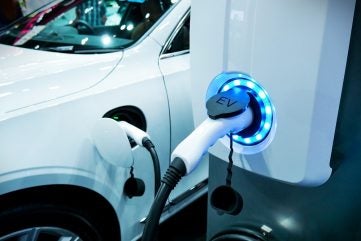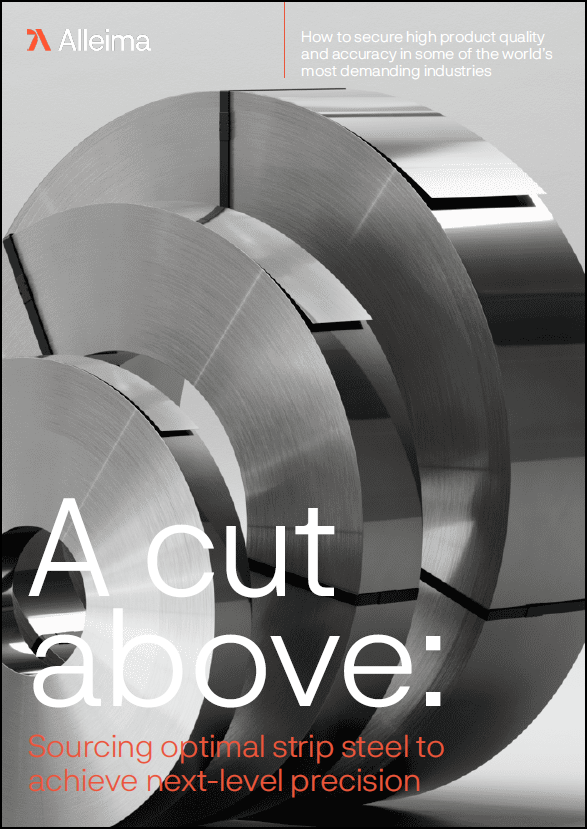
Compressors are among the most demanding applications for strip steel, with some valves required to open and close as many as one hundred and fifty times per second, hitting the seat with high impact each time. Compressor requirements are high for air conditioners in internal combustion engines (ICE), and these escalate in electric vehicles. Some of the reasons for this include:
Battery cooling:
As well as the interior of the car, electric compressors in EVs are also often responsible for cooling the vehicle’s battery pack. Maintaining optimal temperature levels is crucial for the performance and lifespan of electric vehicle batteries. In contrast, traditional ICE vehicles don’t have large battery systems that require specific cooling.
Integration with heat pumps:
While ICE vehicles typically rely on engine waste heat for heating the cabin, electric vehicles do not have this facility. Many use heat pump systems instead. Electric compressors are central to these systems, transferring heat from the external environment to the interior of the vehicle. This is a new role for the compressor that wasn’t the case in ICE vehicles – to support the total thermal management of the EV.
Efficiency for range optimisation:
The efficiency of the heating and cooling system will have an impact on the driving range of the EV. Being able to offer longer driving range is a key competitive advantage in a sector which is still struggling to overcome fears of range anxiety – that the battery will cut out before the driver reaches their destination.
Adaptability to Variable Power Sources:
Electric compressors must be designed to adapt to varying power sources, including the fluctuations in power from the electric vehicle’s battery. In ICE vehicles, the power for the compressor is typically derived directly from the running engine.
Electric motor system cooling
Electric compressors themselves may require cooling, as they often include an electric motor. Proper cooling is essential to ensure the longevity and efficiency of the electric motor, a consideration not present in ICE compressors.
With regulatory and technology changes, compressor manufacturers are racing to develop new products that can offer higher efficiency, quieter operation, compactness, light weight, easier vehicle mounting and high capacity. Compressors for EVs must have durability performance for heating and cooling, says Teru-aki Watanabe, sales manager at high-performance steel and advanced material manufacturer Alleima, as well as being able to satisfy other new requirements as above.
These are new responsibilities requiring additional steel characteristics for the compressor valves that are currently in general use.
This creates new opportunities for steel innovators and Watanabe says he hopes the prowess and innovation Alleima has demonstrated in the HVAC segment for white goods with Alleima Hiflex and its next-generation Alleima Freeflex™ will translate into an exciting new market for the company.
From residential ACs to electric car ACs
Freeflex™ from Alleima, a martensitic stainless compressor-valve steel was designed essentially to support greater sustainability in air conditioning units, in response to feedback from air conditioner manufacturers in China, the world’s biggest AC market. The Chinese Government set the country’s compressor manufacturers’ ambitious targets to reduce energy consumption by 20% in 2030.
“Its fatigue strength – higher than other compressor valve steels on the market – and higher wear resistance, makes Freeflex™ especially suited for the AC demand on improved energy efficiency while keeping noise at a low level,” says Watanabe. “Now, for the same reasons that makes Freeflex™ optimal in ACs and refrigerators, the material properties and related features are well suited to the new demands of electric compressors.
“This is because the operational conditions for compressor valves are getting more challenging, which means that the materials need to have higher fatigue strength, better wear resistance with a further improved microstructure.
“Today, mainly carbon steel is selected for use in ICE compressors with a good-enough performance and reasonable cost. However, in order to meet with coming tougher technical demand for advanced ECs, there will be a growing need for steel products with superior performance capabilities to propel technical innovation to new levels.”
The global market for electric compressors is growing rapidly in line with the shift to electric vehicles. By the end of 2023, the market is expected to be 20 million units, having doubled in size in two years.
“Alleima has a long experience in the automotive industry and our ambition is to continue being a technical partner and solutions provider to the EV sector and work together to evolve the materials required for high-performance electric compressors.”



